English Language
English Language
Overview
The English Language Syllabus 2020 (Primary) emphasizes the progressive development, reinforcement, and extension of language skills through meaningful and engaging learning experiences. It promotes a love for reading, encourages extensive language use, and leverages oracy, reading, and writing to build knowledge and foster independent, confident language users.
The diagram below presents the key features of the EL Syllabus 2020.
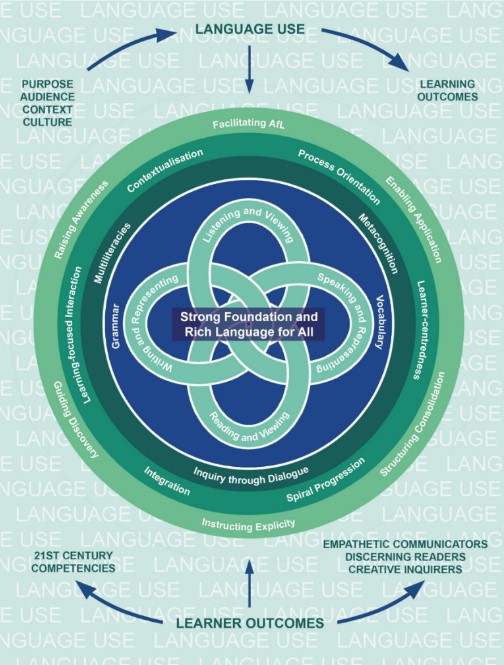
The ELS 2020 aims to develop 21st century skills and emerging competencies in our students and nurture them to be empathetic communicators, discerning readers and creative inquirers.
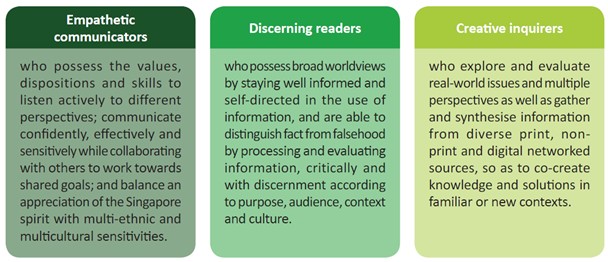
The English Language Syllabus 2020 emphasizes the importance of multiliteracies in enabling students to make and create meaning using diverse semiotic modes across print, visual, audio and digital platforms. By engaging with multimodal and hybrid texts, students develop not only linguistic competence but also media, visual and information literacy skills, preparing them to navigate the complexities of communication in a digitally connected and culturally diverse world.
Our Vision
To nurture Communicative and Confident Learners through the development of speaking, listening, reading, and writing skills.
Our Mission
We aim to build a strong foundation in the English Language among our Yuhualites while providing rich, meaningful, and enjoyable learning experiences that foster a lifelong love for the language.
Curriculum Approach
The school adopts the STELLAR (Strategies for English Language Learning and Reading) approach as the cornerstone of our English Language teaching. STELLAR aims to cultivate a love for reading and strengthen language skills through engaging, student-centred learning experiences.
LOWER PRIMARY STELLAR
The Lower Primary STELLAR Pedagogical Model comprises the following strategies:
-
Shared Book Approach (SBA)
-
Modified Language Experience Approach (MLEA)
-
Learning Centre Activities (LC)
Shared Book Approach (SBA) provides a shared reading experience for teachers to model the reading process and for students to participate actively in the reading. During the first reading, the teacher reads a big book together with students, discussing concepts of print as well as questions about the book being read. In subsequent readings, the teacher teaches target vocabulary and language structures explicitly, as well as other target skills such as concepts of print and phonics. Based on the book being read, teachers may also carry out a range of follow-up activities like speech and drama, music and art.
Modified Language Experience Approach (MLEA) provides students with a shared experience that is linked to the big book read during SBA lessons. The shared experience provides the context and content for students to think and talk about, using the specific language structures and vocabulary they have acquired during the SBA lessons. The teacher facilitates discussions for a piece of group writing before the students progress to pair writing and then individual writing.
Learning Centre Activities are a key component of the Lower Primary STELLAR curriculum. They offer hands-on and engaging tasks that reinforce language skills taught during SBA and MLEA lessons, allowing students to learn at their own pace in a differentiated setting.
To extend classroom learning, students also participate in Learning Journeys to the Singapore Zoo and the S.E.A. Aquarium, making learning come alive through real-world connections and experiencing the joy of discovering new things beyond the classroom.
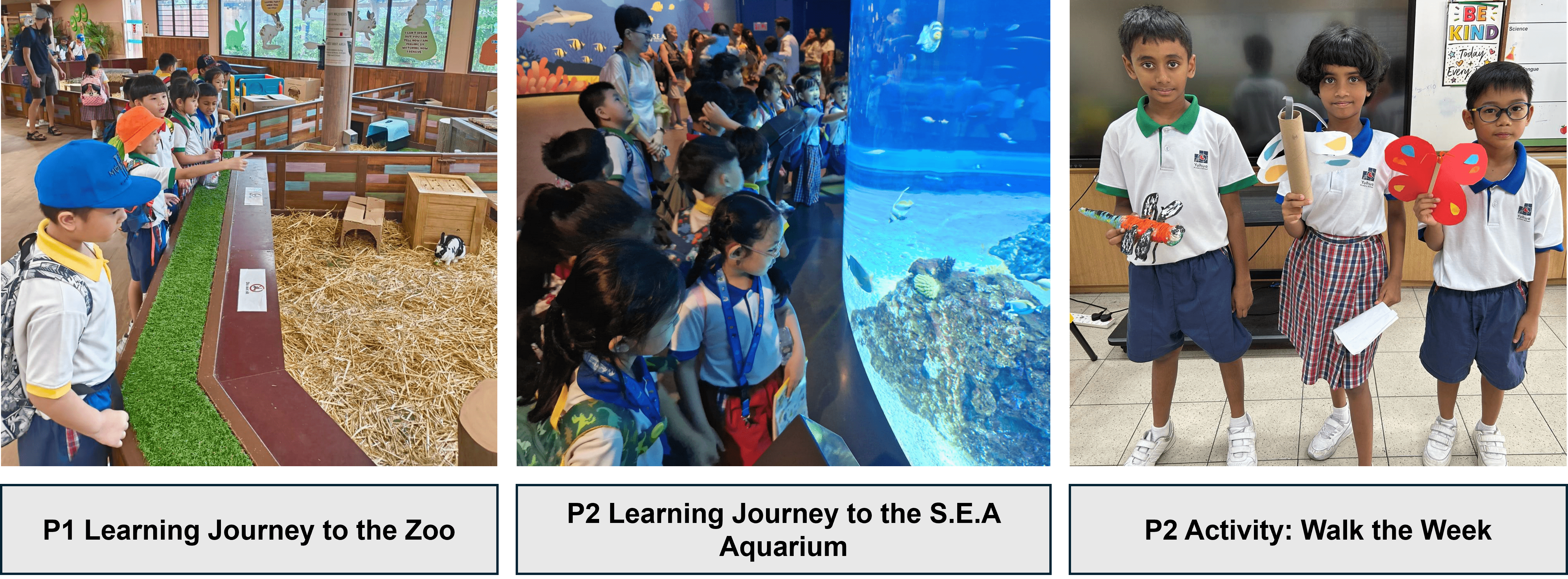
MIDDLE PRIMARY AND UPPER PRIMARY STELLAR
The Middle Primary and Upper Primary STELLAR Pedagogical Model consists of the following strategies:
-
Sustained Silent Reading (SSR)
-
Supported Reading (SR)
-
Know-Want to Know-Learnt (KWL)
-
Retelling (RT)
-
Writing Process Cycle (WPC)
-
Differentiated Instruction (DI)
Sustained Silent Reading (SSR) is regularly practised. Everyone in the classroom reads a book of his/her choice quietly and uninterrupted for ten minutes a day. This provides students with authentic opportunities to enjoy reading while practising their silent reading skills.
Supported Reading (SR) provides a bridge between teacher-supported reading aloud and independent silent reading. It provides opportunities for students to make predictions, read sections of the text silently, discuss the text and unfamiliar words used in context as a whole class.
Know-Want to Know-Learnt (KWL) is used mainly for non-fiction texts. This strategy helps students to extract information and relate it to what they already know about the topic. Teachers guide students to organise, access and remember information from texts read.
Retelling (RT) is a reading comprehension strategy that engages students at different levels of language – from interpreting meaning at the whole text level, to individual words and phrases, and back to the whole text again. It provides opportunities for all the major language skills to be applied as students actively make meaning of texts and share their understanding with their peers.
Writing Process Cycle (WPC) builds on the principles of the MLEA and continues to provide students with guidance in the processes of idea generation, idea selection, idea development, idea organization, review and editing before they apply the skills in writing independently.
Differentiated Instruction (DI) provides students with differentiated support at various points of instruction to optimize their learning. Appropriate activities are designed to support, reinforce and extend students’ learning in reading, writing, oracy, word study, grammar and language use.
Learning Support Programme (LSP)
Believing that every child can learn well at his or her own pace, the Learning Support Programme (LSP) provides enhanced support to selected students in basic literacy skills to enable them to access learning in the regular classroom. The LSP is a specialized early intervention programme aimed at providing learning support to students who enter Primary 1 with weak English Language and literacy skills. Students are identified for LSP through a systematic screening process which is carried out at the beginning of Primary 1.
School-based Dyslexia Remediation Programme (SDR)
School-based Dyslexia Remediation Programme is a two-year intervention programme for Primary 3 and 4 students. These students are identified for support through a systematic screening process for dyslexia conducted at the end of Primary 2. The programme is conducted in small groups by our trained school personnel using a remediation curriculum designed by MOE Reading Specialists.
Reading Remediation Programme (RRP)
The Reading Remediation Programme is aimed at supporting Primary 3, 4 and 5 students who require more support in reading in the English Language. The programme exposes the students to a range of coping strategies for reading comprehension, word recognition and oral reading fluency which will enable them to better manage their daily learning.
READ Period
At Yuhua Primary, our weekly READ Periods are specially designed to nurture a vibrant reading culture and support our students' development as confident, reflective readers.
The READ programme is guided by clear goals at each level:
· P1–P2: Read for Enjoyment – fostering a love for reading through engaging stories and fun literary activities.
· P3–P4: Read for Information – encouraging students to explore diverse texts and acquire knowledge through reading.
· P5–P6: Read for Growth – developing deeper thinking and personal reflection through more complex and meaningful texts.
During READ Periods, Yuhualites are exposed to a wide range of literary genres, including mystery, fiction, and adventure. Through guided exploration of key genre features, students develop a deeper appreciation for storytelling and literary expression.
To foster critical thinking, the programme incorporates the Elements of Thought and Thinking Routines, equipping students with the tools to question, reflect, and make meaningful connections with texts. Reader-response tasks further deepen engagement, allowing students to respond creatively and thoughtfully to their reading.
From Middle to Upper Primary, students exercise greater autonomy by selecting tasks that appeal to their interests—such as designing a book cover or composing a letter to the author—thereby promoting self-directed learning and ownership.
Ultimately, READ nurtures discerning and independent readers who engage with texts purposefully and with enjoyment, laying a strong foundation for lifelong learning.
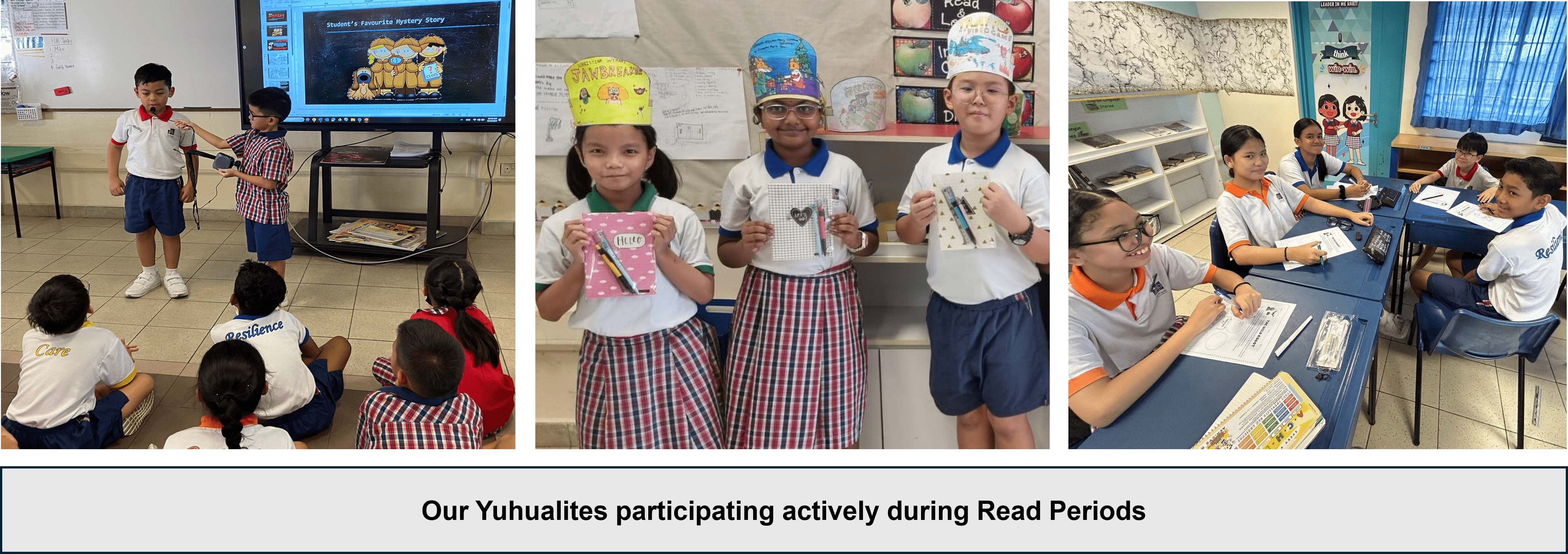
Monthly Current Affairs
At Yuhua Primary School, we aim to nurture students with a broad and informed worldview. Through our Monthly Current Affairs programme, Yuhualites are exposed to a variety of global topics that encourage awareness and critical thinking. Each month features a new theme, and students engage in class discussions where they are invited to share their perspectives and reflect on real-world issues.
Supplementary Materials: Story Time, OWL, WHIZ, National Geographic, What’s Up, iKnowledge
To support and enrich learning, a range of carefully selected magazines is used during English Language lessons. These publications are tailored to our students’ reading levels and designed to spark curiosity, promote critical thinking, and deepen understanding of both local and global issues. The content is current, engaging, and relevant—ensuring students can connect with the material in meaningful ways.
SPEAK@Yuhua:
At Yuhua Primary School, we offer various programmes and activities to develop our students' speaking abilities and boost their confidence in communication.
Yu-Trendz
Yu-Trendz is our initiative designed to develop confident speakers through two platforms:
1. Digital Platform
The Yu-Trendz Padlet serves as an interactive digital platform for students to showcase their ideas, experiences, and creative expressions through video responses to curated prompts. It fosters peer engagement and authentic voice, and sees heightened activity during key school events and celebrations.
2. Recess Activities
This year, the Yu-Trendz recess activities have been thoughtfully designed to provide Yuhualites with authentic opportunities to develop their oracy skills. Through engaging tasks such as tongue twisters and news reporting, selected from the Yu-Trendz Choice Board, students are empowered to build confidence and strengthen their spoken communication in a fun and purposeful manner.
External Speaking Opportunities
We actively encourage our verbally talented students to participate in external peaking competitions, providing them with valuable platforms to showcase and enhance their oracy skills:
1. SPEAK Up! Competition
This annual competition, organized by Speech Academy Asia, offers our students the chance to collaborate with peers whilst developing their public speaking abilities.

Through this platform, our talented Yuhualites express their unique perspectives and inspire others with their ideas.
1. Wits & Words: Inter-school Debate Championship
Co-organised by the Gifted Education Branch and Nanyang Girls' High School, this championship enables our budding debaters to sharpen their critical thinking skills while engaging with peers from other schools in stimulating debates.
2. Mythos (Junior Orators)
This storytelling competition, hosted by the Anglo-Chinese Junior College (ACJC) Debate and Oratorical Society, provides an excellent platform for our students to showcase and enhance their narrative skills and creative expression.
3. YMCA Plain English Speaking Awards (PESA)
This prestigious national competition, organized by YMCA of Singapore and supported by the Ministry of Education (MOE) and Speak Good English Movement (SGEM), offers our students the opportunity to refine their public speaking abilities and build self-assurance in a competitive environment.
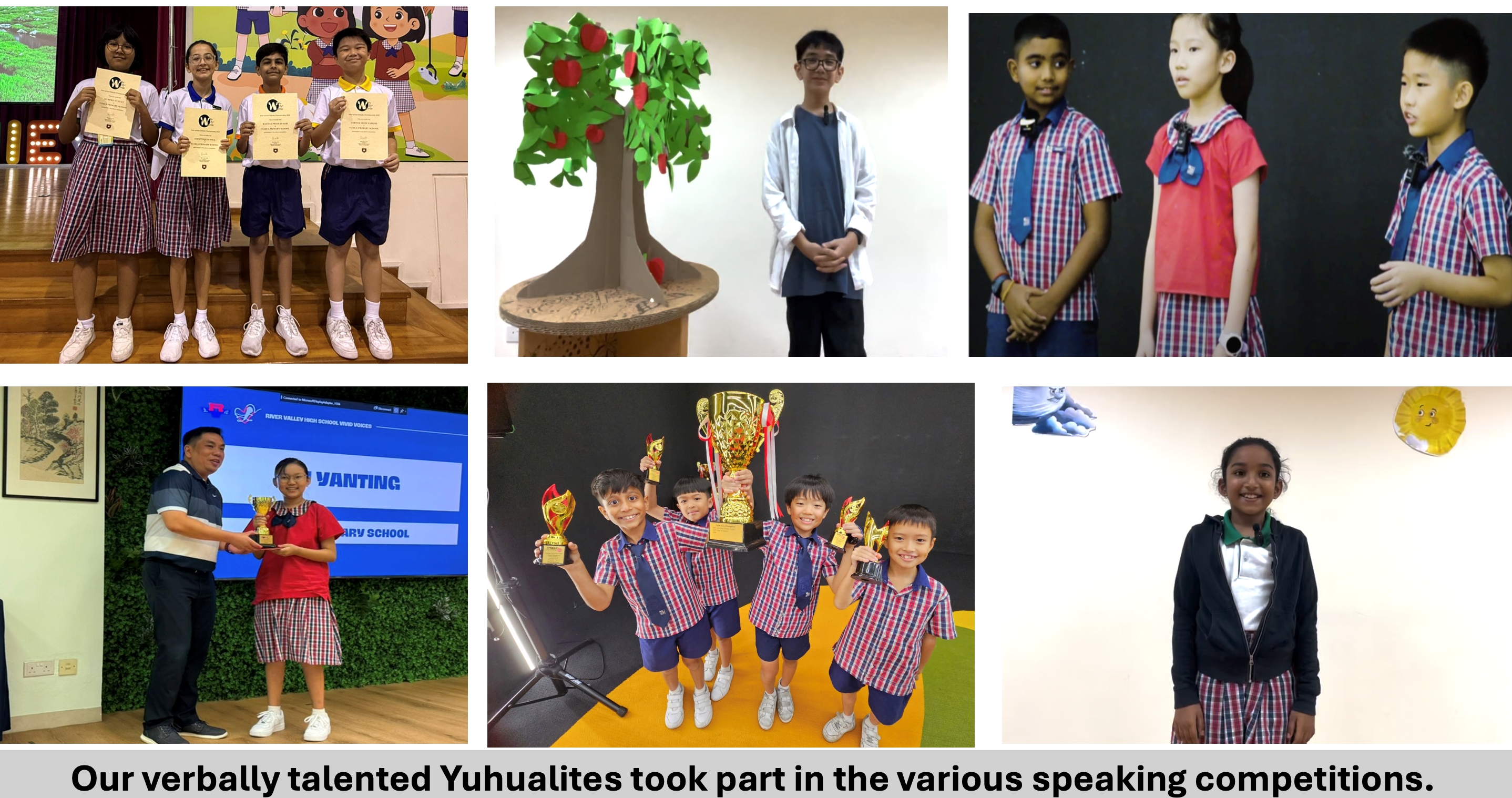
Language Level Competitions
To celebrate the end of examinations, our Yuhualites would have a language level competition. Our Yuhualites played word games such as Spelling Bee or Scattergories. It was a happy way to relax, have fun with friends, and celebrate their hard work.


